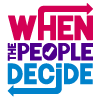Season 2, Episode 2
Putting money and power in the people’s hands
Take a deep dive into the practice of participatory budgeting and learn how it can bring civic power to people who are not normally in the driver's seat on local decisions.
The United Nations calls participatory budgeting a best practice for a democratic government and the New York Times calls it “revolutionary civics in action." Participatory budgeting, or PB for short, deepens democracy, builds stronger communities, and creates a more equitable distribution of public resources.
Around 7,000 cities worldwide do it, including some communities in the U.S. It involves residents actively deciding where their city’s money will be spent —everything from new community centers to improvements to neighborhood parks. Those who work on PB believe that it can increase civic power and lead to a more inclusive, equitable democracy.
In this Episode
Andrew Holland
Andrew Holland, assistant director of budget and management services in Durham, North Carolina. His team oversees the city’s participatory budgeting process, which has allocated millions of dollars to the city’s residents since 2018. He holds a bachelor’s degree in urban planning from East Carolina University and a master’s degree in public administration from North Carolina Central University.
Hollie Russon Gilman
Hollie Russon Gilman, a senior fellow in political reform at New America and an affiliate fellow at Harvard's Ash Center for Democratic Governance and Innovation. Her work focuses on topics at the intersection of civic engagement, digital technology, and governance. She is the author of Democracy Reinvented: Participatory Budgeting and co-author with K. Sabeel Rahman of Civic Innovation and America and Civic Power: Rebuilding American Democracy in an Era of Crisis.



